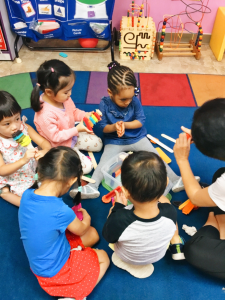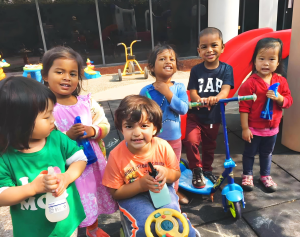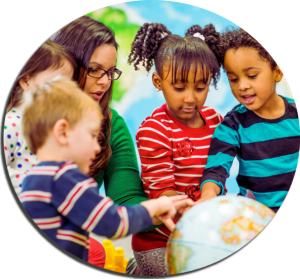
The Impact of Early Childhood Education on Long-Term Academic Success: Insights from Dublin’s Preschools
Early childhood education (ECE) has long been recognized as a crucial foundation for long-term academic success. The experiences and skills children gain in their formative years set the stage for their future educational journey. During these early years, children undergo rapid cognitive, social, and emotional development, making it an ideal period for impactful educational interventions. High-quality ECE programs not only prepare children for the academic challenges ahead but also foster a love for learning that can last a lifetime.
Recent insights from Dublin’s preschools underscore the profound impact of high-quality ECE programs on children’s development and later academic achievements. Dublin, known for its commitment to educational excellence, has implemented various innovative strategies in its preschools that emphasize holistic development. These strategies include play-based learning, individualized attention, and strong parental involvement, all of which contribute to creating a supportive and enriching learning environment.
The Importance Of Early Childhood Education
Early childhood is a period of rapid cognitive, social, and emotional development. During these formative years, the brain undergoes significant growth, making children highly receptive to learning and absorbing new information. This phase, often referred to as the “critical period,” is when the foundations for future learning and behavior are established. The experiences and interactions that children have during this time profoundly influence their development and long-term academic success.
Insights From Dublin’s Preschools
Preschools in Dublin have been at the forefront of implementing innovative ECE strategies that emphasize holistic development. Several key insights have emerged from these programs:
Play-Based Learning: A Cornerstone of Dublin Preschools
Play-based learning is a fundamental approach utilized by preschools in Dublin, and it has been shown to be highly effective in promoting cognitive and social development among young children. This educational philosophy is grounded in the belief that play is not only a natural and enjoyable activity for children but also a powerful medium for learning. Through play, children engage in a wide range of experiences that help them develop essential skills in a holistic and integrated manner.
Cognitive Development
In Dublin preschools, play-based learning is strategically designed to enhance cognitive development. When children participate in play, they are often involved in activities that require them to think critically and solve problems. For example, building with blocks, completing puzzles, and engaging in imaginative play scenarios require children to plan, organize, and execute their ideas. These activities stimulate brain development and enhance cognitive functions such as memory, attention, and executive functioning.
Language And Communication Development
Play-based learning also significantly contributes to the development of language and communication abilities. Through interactive play, children are constantly using and hearing language, which helps them expand their vocabulary and improve their conversational skills. Role-playing games, where children take on different characters and scenarios, are particularly effective in this regard. These activities encourage children to use new words, form sentences, and express their thoughts and feelings verbally.
Social Development
Building social connections and developing interpersonal skills are key outcomes of play-based learning in Dublin preschools. Through cooperative play, children learn how to interact with others, share, take turns, and resolve conflicts. These social interactions are critical for developing empathy, understanding different perspectives, and forming positive relationships with peers.
Emotional Development
Play-based learning also plays a significant role in emotional development. Through play, children explore their emotions, develop self-regulation skills, and build resilience. Engaging in imaginative play allows children to express their feelings and work through complex emotions in a safe and controlled environment.
Physical Development
Physical play activities are another critical aspect of play-based learning. They help children develop fine and gross motor skills, which are essential for their overall physical health and coordination. Activities such as climbing, running, and jumping improve muscle strength and coordination, while fine motor activities like drawing, cutting with scissors, and manipulating small objects enhance hand-eye coordination and dexterity.
Enhancing Creativity And Imagination
Play-based learning encourages creativity and imagination, which are vital for intellectual and emotional growth. When children engage in creative play, they explore new ideas, experiment with different roles, and create imaginative worlds. This kind of play helps children develop flexible thinking and problem-solving abilities.

Individualized Attention: A Key Feature Of Dublin’s Preschools
One of the distinguishing features of Dublin’s preschools is the emphasis on individualized attention. This approach is made possible through the maintenance of small class sizes and low student-to-teacher ratios, which are crucial in ensuring that each child receives the personalized care and instruction they need to thrive.
Personalized Learning Experiences
With fewer students per class, teachers in Dublin’s preschools can devote more time and resources to understanding and addressing the individual needs of each child. This personalized attention allows educators to create tailored learning experiences that align with each child’s interests, strengths, and developmental stage.
Early Identification Of Needs
Individualized attention also enables educators to identify and address any areas of need early on. In a setting where teachers can closely monitor each child’s progress, they are more likely to notice when a child is struggling with a particular concept or skill.
Nurturing Unique Strengths
In addition to addressing areas of need, small class sizes and low student-to-teacher ratios allow teachers to nurture each child’s unique strengths and talents. By spending quality time with each student, educators can recognize and encourage their individual interests and abilities. Whether a child shows an early aptitude for music, art, science, or physical activities, personalized attention helps ensure that these talents are nurtured and developed.
Building Strong Teacher-Child Relationships
The close interaction between teachers and students in small class settings also helps build strong, trusting relationships. These positive relationships are foundational for a child’s social and emotional development. When children feel understood and supported by their teachers, they are more likely to engage actively in learning, exhibit positive behaviors, and develop a sense of security and belonging in the school environment.
Enhancing Overall Educational Outcomes
Ultimately, the individualized attention afforded by small class sizes and low student-to-teacher ratios in Dublin’s preschools contributes significantly to enhancing overall educational outcomes. Children receive the support they need to overcome challenges, the encouragement to pursue their interests, and the guidance to develop critical academic and social skills. This personalized approach ensures that each child is well-prepared for the next stages of their educational journey, setting a strong foundation for lifelong learning and success.

Parental Involvement: A Cornerstone Of Dublin Preschools
In Dublin preschools, parental involvement is not just encouraged; it’s celebrated as a crucial component of the educational journey. Recognizing that parents are their children’s first and most influential teachers, these preschools actively seek to foster strong partnerships between parents and educators. By engaging parents in their children’s education, these programs ensure that learning extends beyond the classroom and into the home environment, creating a supportive and cohesive learning community.
Building Strong Partnerships
Dublin preschools place a high value on building strong partnerships with parents right from the start. From the moment a child enters preschool, parents are welcomed into the educational process with open arms. Teachers and staff make a concerted effort to establish positive relationships with parents, fostering trust, communication, and mutual respect.
Involving Parents In Classroom Activities
Dublin preschools actively involve parents in classroom activities and events, recognizing that parents play a crucial role in enriching their child’s educational experience. Parents are invited to participate in special events, such as class parties, field trips, and cultural celebrations. They may also be invited to share their expertise or cultural traditions with the class, providing valuable insights and experiences that enhance the curriculum.
Extending Learning Beyond The Classroom
Dublin preschools recognize that learning doesn’t stop when the school day ends. To ensure that learning extends beyond the classroom and into the home environment, these programs provide parents with resources, tips, and strategies to support their child’s learning at home.
Empowering Parents As Partners In Education
By actively involving parents in their children’s education, Dublin preschools empower parents to be active participants in their child’s learning journey. Parents are encouraged to share their observations, concerns, and goals for their child’s development, fostering a collaborative approach to education.
Focus On Social-Emotional Development: Nurturing Well-Rounded Individuals In Dublin’s ECE Programs
In Dublin’s esteemed early childhood education (ECE) programs, there is a profound emphasis on social-emotional learning (SEL), recognizing it as a cornerstone of holistic child development. These programs prioritize the cultivation of crucial skills such as emotion regulation, empathy, and relationship-building, acknowledging their paramount importance not only for academic success but also for the overall well-being of each child.
Cultivating Emotional Intelligence
Dublin’s ECE programs are dedicated to nurturing emotional intelligence in young learners. Children are provided with a supportive environment where they can explore and express their feelings in a safe and understanding atmosphere. Through guided activities and discussions, educators help children identify and articulate their emotions, teaching them healthy ways to manage and cope with various feelings.
Fostering Empathy And Perspective-Taking
Empathy is a fundamental aspect of social-emotional development, and Dublin’s ECE programs are committed to fostering this essential skill in young children. Through experiential learning opportunities, children are encouraged to step into the shoes of others, understand different perspectives, and empathize with their peers.
Building Positive Relationships
Building positive relationships is a central focus of Dublin’s ECE programs. Educators prioritize creating a warm, inclusive, and supportive classroom environment where children feel valued, respected, and connected to their peers and adults. Through collaborative activities, group discussions, and cooperative play, children learn essential social skills such as communication, cooperation, and conflict resolution.
Integrating SEL Across The Curriculum
In Dublin’s ECE programs, social-emotional learning is seamlessly integrated into all aspects of the curriculum. Educators recognize that SEL is not a standalone subject but rather an essential component of every learning experience. Whether children are engaged in literacy activities, math games, science experiments, or creative arts projects, opportunities for social-emotional growth are intentionally woven into the fabric of daily learning.

Long-Term Academic Benefits
Research consistently shows that children who attend high-quality ECE programs perform better academically in later years. The benefits observed in Dublin’s preschools mirror these findings:
- Improved Literacy and Numeracy: Children who participate in effective ECE programs enter primary school with a strong foundation in reading and math. This head start often translates into higher academic achievement throughout their school years.
- Enhanced Critical Thinking Skills: Early exposure to problem-solving activities and exploratory learning helps children develop critical thinking skills. These abilities are essential for success in a rapidly changing and complex world.
- Greater Social Competence: Children who receive early social-emotional support are better equipped to navigate the social dynamics of school. They tend to have better relationships with peers and teachers, contributing to a positive and conducive learning environment.
- Increased Graduation Rates: Longitudinal studies indicate that children who attend high-quality ECE programs are more likely to graduate from high school and pursue higher education. This outcome is linked to the strong academic and social foundations established during the early years.
Conclusion
The insights from Dublin’s preschools highlight the transformative power of early childhood education. By investing in high-quality ECE programs, communities can lay the groundwork for future academic success and overall well-being of their children. The experiences and skills gained during these formative years have lasting impacts, underscoring the importance of prioritizing early childhood education as a critical component of educational policy and practice.
As Dublin continues to innovate and refine its preschool programs, the evidence is clear: early childhood education is not just about preparing children for school; it’s about preparing them for life.
